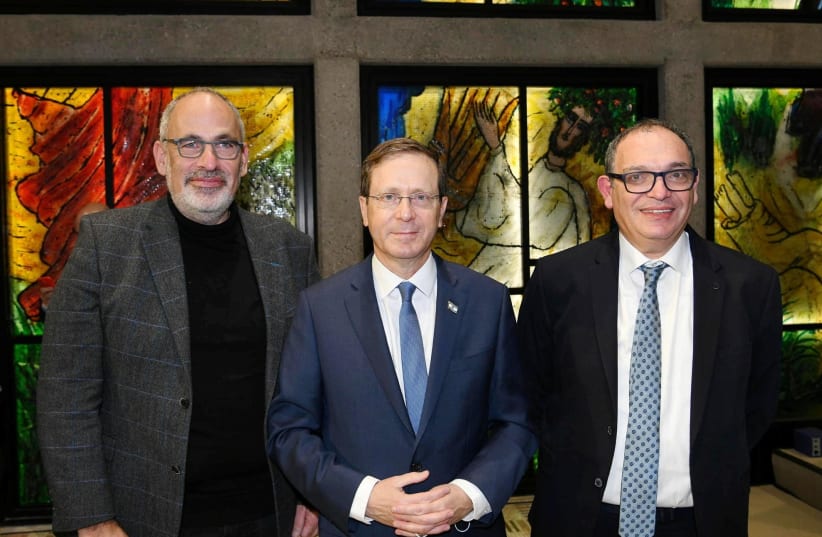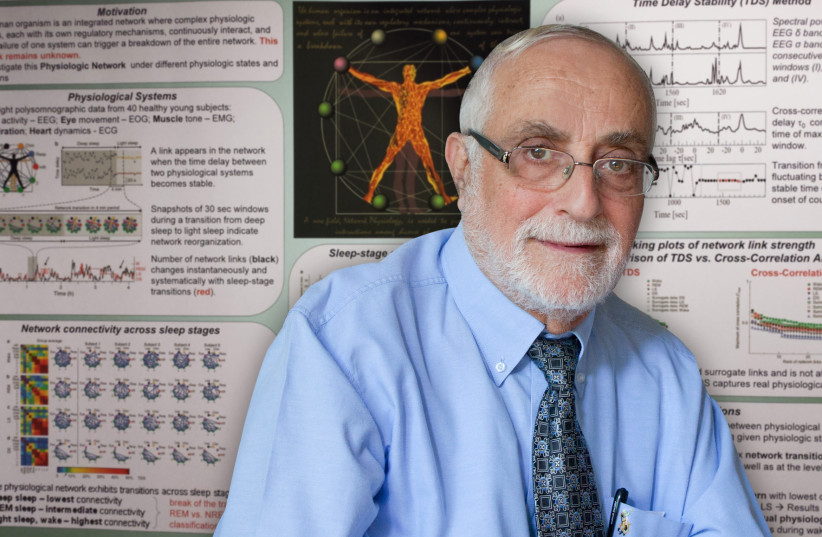Around the same time that he mounted his campaign in which he urged internet surfers to think twice before posting messages that can be hurtful or harmful, President Isaac Herzog last week hosted a study evening in advance of the 10th day of the Hebrew calendar month of Tevet. It’s a day of mourning, primarily for victims of the Holocaust, whose place and cause of death are unknown and whose place of burial is likewise unknown.
Among the participants were former Education minister Rabbi Shai Piron, who is one of the founders of Tzohar and who inter alia is president of Pnima, a movement established in 2015 by public figures and leaders from across the social spectrum to address the rifts and polarization in Israeli society in an attempt to find common ground on which there could be consensus.
The theme of the study evening was destruction and building. The 10th of Tevet initially marked the siege of Jerusalem which eventually led to the destruction of the first and second Temples.
After the Holocaust, when the fate of so many was unknown, the date was also decreed as a day of mourning for those who might have no one left to mourn for them.
Herzog opened the discussion by recalling that the 10th of Tevet is a day of fasting and mourning for the destruction of Jerusalem. It didn’t happen in one day, he said, because destruction is a process. Recent and distant history have taught us of the dangers of baseless hatred, Herzog continued, emphasizing the importance of learning from the past in order to do to avert baseless hatred in the present, and thereby prevent future grief and calamities.
Piron spoke of the merging of statesmanship and tradition which he believes can influence all sectors of the population and can restore national and family unity.
■ GLOBAL JEWISH unity is most commonly expressed through charitable endeavors. Aside from what Jews around the world do for the benefit of their own communities, they also form supportive organizations of friends for numerous Israeli social welfare, health, educational and cultural organizations and institutions.
These organizations of friends bring Jews in the diaspora together in identifying with causes in Israel and simultaneously benefit the organizations and institutions for which they raise funds. While this is positive in more ways than one, it is also sad that Israel, which is no longer a poor country, has to place so much reliance on the generosity of diaspora Jews. If one travels through the ultra-Orthodox neighborhoods of Jerusalem for instance, one cannot help but notice how many yeshivot and other institutions have their titles on the wall in large letters signifying in English, and sometimes French, the names of the donors of the building. This does not mean that the affluent sector of Israel’s population holds back on support, but it shows that the government does not do nearly enough in areas of social welfare and education.
Earlier this month, popular singer Keren Peles was in London to perform at a fund-raiser for Simcha LaYeled that was hosted by international journalist Shirit Gal Kedar, and included some 300 Israeli residents of London in the audience.
It would be a safe bet to say that most Israelis have never heard of Simcha LaYeled. There are scores of such relatively obscure organizations that receive most of their funding from abroad, because the government of Israel does not give them sufficient support to be able to continue with their good work. The concert in London was sponsored by JNF UK, which supports several organizations and institutions in Israel, and was held at the Leonardo Hotel in St Paul’s courtesy of the Fattal hotel chain, which is headquartered in Israel and is headed by David Fattal. The event, which was largely supported by Israelis living in London, aimed to raise £108,000 to help children with severe physical disabilities but normal cognitive abilities.
With this additional funding, Simcha LaYeled will be able to work with an additional 60 children from Be’er Sheva and elsewhere in the south of the country, to enable them to integrate into mainstream society.
■ FOLLOWING ALL the news reports about Tel Aviv being the most expensive city in the world, Mayor Ron Huldai, was interviewed by The Marker, the financial supplement of Ha’aretz, and candidly admitted that he had no solution for stemming rising prices of real estate. Moreover, he did not think that the construction glut of tall towers that will result in thousands of additional apartments will bring down the cost of rentals or purchases. Huldai sees himself as a social democrat, and as mayor oversees that 300 affordable apartments are annually made available to city residents who cannot afford the extraordinary high rentals that are being demanded by landlords. Huldai, 77, who came into office in 1998, said that together with the residents of his city, he has been battling the policies of a government of “right wing conservative capitalists” who have attempted to do away with public housing, while he has been fighting for additional public housing for the needy. Huldai predicted that Tel Aviv will become even more expensive than it is already. The problem is that so many residents of the seaside city that never stops are willing to pay the price for living there, rather than go to a less exciting, much more affordable city. The only way to bring down prices is for a major exodus. There is a limit to how long landlords will put up with no income from their properties, but very few2 people living in Tel Aviv are inclined to leave.
■ YET ANOTHER faculty member of Bar Ilan University has brought honor to the institution where he teaches and does his research.
Prof. Shlomo Havlin, of the Department of Physics at BIU, has been elected an Institute of Physics 2021 Honorary Fellow in recognition of being among the pioneers of the field of Complex Networks and, in particular, the subfield of Interacting Networks based on statistical physics and percolation theory.
The Institute of Physics (IOP) is the professional body and learned society for physics, and the leading body for practicing physicists, in the UK and Ireland. An Honorary Fellowship is the highest accolade awarded by the IOP. Havlin has been one of the leading pioneers in the rapidly-expanding multidisciplinary field of network science that emerged in 2000. He and his students developed the first percolation theory approach that proved that complex networks are in a new, previously unknown universality class. Their breakthrough discovery of the unusual robustness in these networks led to further discoveries by Havlin and others of many new laws governing the structure and function of complex networks and understanding open questions in many disciplines. These discoveries include, for example, the “ultra-small world” concept, showing that the diameter of modern networks of N nodes is dramatically smaller than the diameter of random (ER) networks and scales. Havlin’s group extended these studies and developed an efficient immunization strategy for computer and population networks. This approach, called “the acquaintance immunization approach,” reduces the critical threshold of immunization by a factor of 3.
In 2005 Havlin and his colleagues developed a novel approach for studying self-similarity in networks. They found that fractal features exist in many complex networks, a result that led to a better understanding of the topology and function of complex networks in many disciplines. His book on Complex Networks (Cambridge University Press, 2010) with his former student Reuven Cohen (now Professor of Mathematics at Bar-Ilan University) is a classic textbook in the field of network science.
In 2010 Havlin pioneered and developed the rapidly-expanding subfield of interacting networks. He and his collaborators introduced and developed a mathematical framework based on percolation concepts for studying the resilience of “networks of networks.”
Prior to 2010 there were no systematic tools for studying and understanding the properties of interacting networks. The general analytical results and Havlin’s discovery of a rich behavior that does not exist in single, isolated networks show that percolation theory of single networks is a specific limited case of the general category for networks of networks. The rich, novel phenomena found in networks of networks, including the strong influence of spatial embedding, a new “localized” type of failure, and the phase diagram when recovery of nodes is introduced are among the recent discoveries of Havlin’s group.
Recently, for the second year in a row, Havlin won the “Most Cited Researcher in Physics” award. In 2018 he was awarded the coveted Israel Prize in Physics.
An IOP Honorary Fellowship is presented to reflect an individual’s exceptional services to physics. Every member of the IOP’s celebrated community of Honorary Fellows has contributed significantly to the advancement of physics through a range of means, and serves as an ambassador for physics, physicists and the IOP.
In congratulating new Honorary Fellows named this year, Institute of Physics President Professor Sheila Rowan said: “Our Honorary Fellows represent an extraordinary group of physicists who have individually and collectively advanced our field. Each of them has made a significant positive difference to our understanding of, and pursuit of progress in, physics, and represents an example of what we as a community can achieve.”
greerfc@gmail.com

